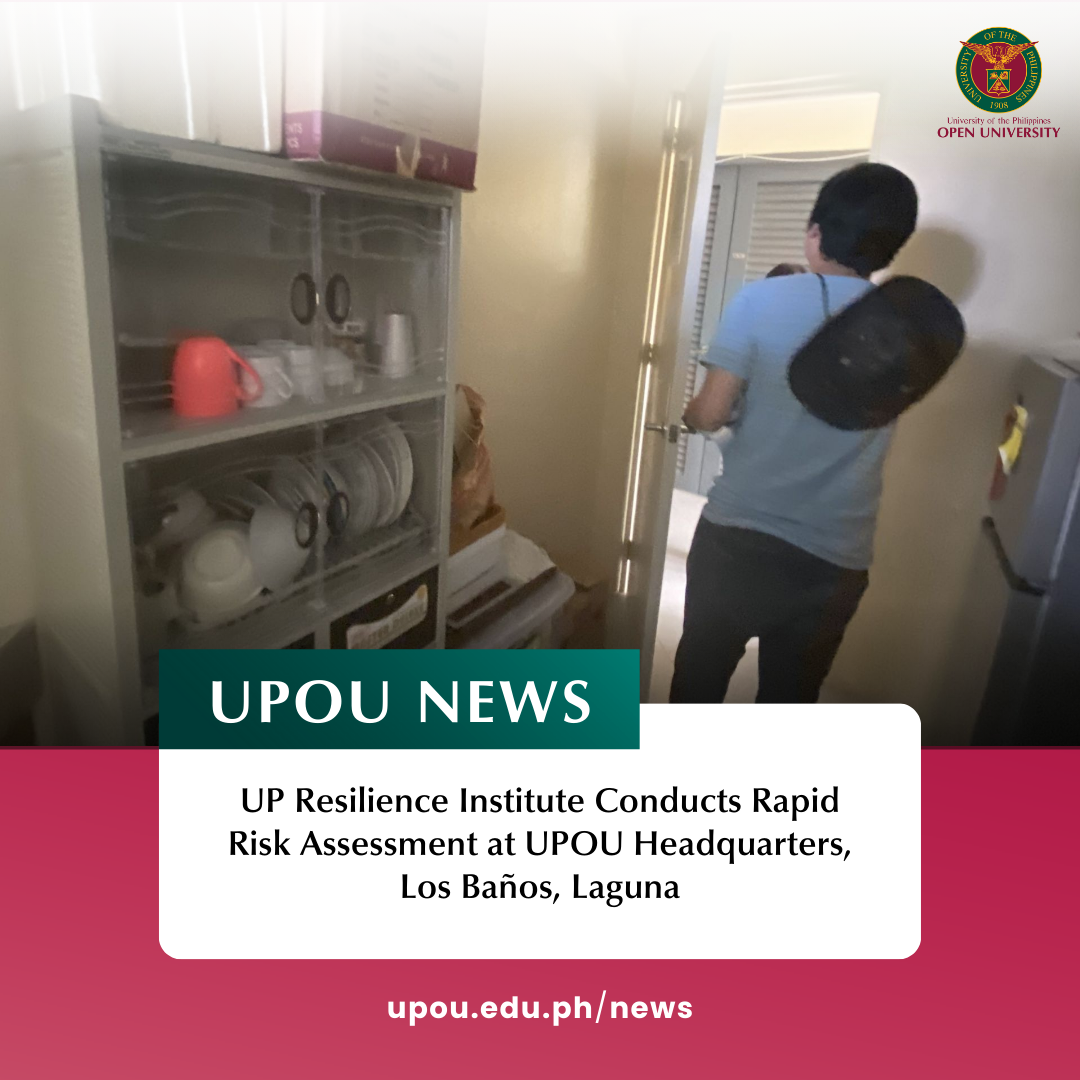
The University of the Philippines Open University (UPOU) is taking proactive steps to enhance its Disaster Risk Reduction and Management (DRRM) plans. On 13 June 2024, a rapid risk assessment was conducted by the UP Resilience Institute (UPRI) to identify potential hazards across the UPOU Headquarters campus infrastructure in Los Baños, Laguna. This rapid risk assessment was in collaboration with the UPOU Disaster Risk Reduction and Climate Change Adaptation and Mitigation (DRR-CCAM) Committee, formerly known as the DRRM Committee, and Campus Development and Maintenance Office (CDMO).
The exercise was led by Ms. Jerzyne Anne Corpuz and Mr. Jonathan David Maligalig from UPRI’s Institutional Building Division. They were joined by representatives from CDMO including Engr. Maria Sandra Therese Cacas, Senior Engineering Assistant and Mr. Erwin Moong, Senior Project Assistant, and UPOU Faculty of Management and Development Studies’ representative Ms. Janelle Ebron. Together, they did the exercise to ensure a thorough evaluation of the campus’ vulnerability to various risks.
Preliminary results of the assessment indicate that UPOU’s buildings and infrastructure are relatively new and, therefore, considered to be in good condition. However, this does not preclude the need for heightened vigilance and improvement. The rapid risk assessment has provided valuable insights that will serve as a reference for updating and enhancing the university’s existing emergency plans.
The UPOU DRR-CCAM Committee is tasked with developing comprehensive disaster-related plans for the university—emergencies and incidents included. The findings from the rapid risk assessment will be instrumental in revising and upgrading the old DRRM plan. The committee, with the strong guidance of UPRI, is committed to integrating the findings into the emergency plans to address identified risks and vulnerabilities, and implementing these improvements to ensure long-term safety and resilience.
Conducting a rapid risk assessment underscores the importance of safety, resilience, and sustainability in educational institutions like UPOU, and supports the following key United Nations Sustainable Development Goals (SDGs):
SDG 3: Good Health and Well-being
By identifying and mitigating potential hazards, the rapid risk assessment contributes to ensuring healthy lives and promoting well-being for all UPOU constituents composed of faculty, students, and staff. This includes improving emergency response and preparedness, which is crucial for maintaining health and safety on campus.
SDG 4: Quality Education
Ensuring a safe learning environment is fundamental to providing quality education. The assessment helps to create a secure and resilient educational setting, which is essential for students to learn effectively and for faculty to teach without disruptions.
SDG 9: Industry, Innovation, and Infrastructure
The focus on assessing and improving campus infrastructure aligns with building resilient infrastructure. By addressing potential risks and enhancing the safety and durability of buildings, UPOU supports sustainable industrialization and fosters innovation in safety and risk management practices.
SDG 11: Sustainable Cities and Communities
The exercise contributes to making UPOU a safer, more inclusive, and resilient community. By improving disaster risk reduction and management plans, the university enhances its ability to cope with natural disasters and other emergencies, which is a key aspect of sustainable urban and community development.
SDG 13: Climate Action
The involvement of the UPOU DRR-CCAM Committee highlights the university’s commitment to taking urgent action to combat climate change and its impacts. The assessment helps identify vulnerabilities related to climate change and develop strategies to enhance resilience against climate-related risks.
SDG 17: Partnerships for the Goals
The collaboration between UPOU and UPRI exemplifies the importance of partnerships in achieving sustainable development. By working together, these institutions can share knowledge, expertise, and resources to effectively address disaster risk reduction and management challenges.
Written by: Janelle Ebron • Edited by: Larry N. Cruz • Crossposted from FMDS Official Website








